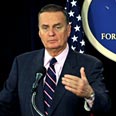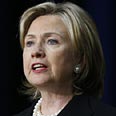

Obama advisor: US to push for Iran sanctions in January
National security advisor says Washington working to impose new punitive measures on Islamic republic at UN Security Council within a month. Door to diplomacy will stay open till 'the end of this calendar year, which is rapidly approaching,' he clarifies
WASHINGTON - US National Security Advisor James Jones clarified Friday that Washington was working to impose new sanctions on Iran at the United Nations Security Council within a month. He noted that the American administration would impose its own additional punitive measures on Tehran.
“Iran still controls its destiny on this issue, but it’s not going to stay open much longer,” Jones said in an interview with the Wall Street Journal.
He added that if the Islamic republic failed to meet the demands, the world powers would launch efforts in January to promote new sanctions against Tehran at the UN Security Council, efforts which he believes would take about a month.
The door to diplomacy would "stay open as long as we could leave it open," he stated, adding that means "the end of this calendar year, which is rapidly approaching."
The United States, Britain and France warned Thursday that Iran would face further sanctions if it does not immediately comply with United Nations resolutions regarding its nuclear program.
For the first time, Iran's violations, including nabbed weapon transfers, were up for an open debate at the UN's Security Council Thursday, in the presence of ambassadors and not only professional teams.
In a no-frills speaking style, Jones said bluntly that "our goal is to get 1,200 kilograms of low-enriched uranium out of Iran." He seemed confident that Russia and China were moving Washington's way on the subject.
He also said there was "hope" that Turkey would come along, despite Prime Minister Recep Tayyip Erdogan's recent statements. Jones said that President Barack Obama asked the Turkish leader to "use his good offices to convey the seriousness of the situation to Iran" during a White House meeting earlier this week.
"The goal very simply is to give Iran a chance, without sanctions or with sanctions, to give a clear statement of policy with regard to their future ambitions concerning the development of nuclear weapons and the delivery means to go with them," the national security advisor said.
"As long as there's an open question on both of those issues, then Iran is just asking the world to trust them. And Iran hasn't reached that status in the world where people will just trust them."
Clinton to Latin America: 'Think twice'
Meanwhile Friday, US Secretary of State Hillary Clinton warned Latin American countries to "think twice" about fostering ties with Iran because of its alleged support for terrorism.
"I think if people want to flirt with Iran, they should take a look at what the consequences might well be for them. And we hope that they will think twice and we will support them if they do," the chief US diplomat said.
During a question-and-answer session at the State Department's public policy forum on Latin America, Clinton said it was a "very bad idea for the countries involved" to allow Iran to establish itself in the region.
In a sign of Iran's push for closer ties with the mostly leftist governments thriving at the doorstep of the United States, Iranian President Mahmoud Ahmadinejad visited Venezuela, Bolivia and Brazil last month.
"We hope that there will be a recognition that this is the major supporter, promoter and exporter of terrorism in the world today," Clinton said.
European Union leaders on Friday urged international action against Iran because of its refusal to cooperate over its nuclear program.
"Iran's persistent failure to meet its international obligations and Iran's apparent lack of interest in pursuing negotiations require a clear response," said a statement approved by the 27 EU leaders at a summit in Brussels.
"The European Union stands ready to take the necessary steps," it said, ordering EU foreign ministers to prepare these "steps," without elaborating on whether that would mean separate EU sanctions or support for new United Nations sanctions.
The White House issued a statement Friday saying it shares Europe's "grave concern".
Reuters, The Associated Press and AFP contributed to this report















